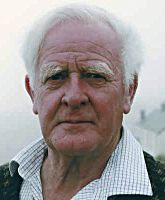
"When you spy intensively and you get closer and closer to the border... it seems such a small step to jump... and, you know, find out the rest," the writer said.
Asked if he was genuinely tempted, he replied: "Yes, there was a time when I was, yes."
Le Carre worked for the Secret Intelligence Service (MI6), Britain's external intelligence agency.
But his career as a secret agent was wrecked by Kim Philby, a British double agent who blew the cover of many British agents to the KGB Soviet intelligence agency.
His most well-known novel, "Tinker, Tailor, Soldier, Spy" (1974), deals with a Soviet mole and is based on his experiences from the 1950s and 1960s, drawing on Philby's role.
Le Carre was offered the chance to dine with Philby in 1987, by a Soviet intermediary, but turned it down.
"I just couldn't do it... he was responsible for sending countless British agents to their deaths, to be killed -- 40 or more in Albania."
Asked if he was genuinely tempted, he replied: "Yes, there was a time when I was, yes."
Le Carre worked for the Secret Intelligence Service (MI6), Britain's external intelligence agency.
But his career as a secret agent was wrecked by Kim Philby, a British double agent who blew the cover of many British agents to the KGB Soviet intelligence agency.
His most well-known novel, "Tinker, Tailor, Soldier, Spy" (1974), deals with a Soviet mole and is based on his experiences from the 1950s and 1960s, drawing on Philby's role.
Le Carre was offered the chance to dine with Philby in 1987, by a Soviet intermediary, but turned it down.
"I just couldn't do it... he was responsible for sending countless British agents to their deaths, to be killed -- 40 or more in Albania."









 Home
Home Politics
Politics









